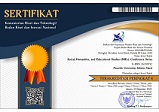The Effectiveness of academic Self-Efficacy and Learning Pancasila Values to Reduce Bullying Behavior in Elementary School Students
Abstract
Bullying behavior is a serious problem in schools. Bullying behavior can be carried out physically or non-physically, either through social media or directly, so that students feel threatened, afraid, traumatized, and it has a big impact on learning activities. This research focuses on the effectiveness of academic self-efficacy and learning Pancasila values to reduce bullying behavior in students. This research uses a qualitative approach with a case study type of research. The data used are the results of observations, interviews, questionnaires and documentation. To obtain valid data, this research applies source triangulation and method triangulation. The analysis was carried out by applying a descriptive qualitative interactive model approach through the steps of data collection, data condensation, data display, and conclusion: drawing/verifying. The research results show that the application of Pancacila values has a role in shaping character because each value of the Pancasila principles contains behavioral guidelines that must be applied in everyday life. In this case, the application of Pancasila values can reduce bullying behavior from both the perpetrator and the victim. Academic self-efficacy influences how students interpret environmental situations, anticipation, strategies, and actions that can be taken to minimize the impact of bullying behavior.
Keywords
Full Text:
PDFRefbacks
- There are currently no refbacks.





